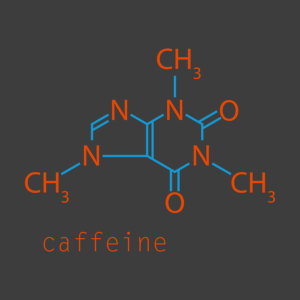Supplement Round Up: Caffeine
By Chris Newport, MS, RDN, LDN, CISSN
What is caffeine?
Caffeine is a compound that is naturally occurring in cocoa beans, coffee beans, and tea leaves. It can be naturally extracted or synthetically created. It’s often added to drinks like soda, gels, sports drinks, pre-workout formulations, fat-burners, and energy drinks.
Caffeine stimulates the central nervous system (CNS) and acts as an adenosine receptor antagonist. Adenosine is a substance in your body that promotes sleepiness. Caffeine blocks the adenosine receptor so you feel more alert. It also improves memory following 65-200mg are taken.
You can find a list of the most commonly consumed foods and beverages with caffeine content here and here.
Caffeine and Genetics
There is a genetic link to how quickly you process caffeine. The average time for an average cup of coffee to metabolize is 5 hours. This is different if you have certain genes.
The CYP1A2 genotype is linked to the metabolism of caffeine. In this study on endurance athletes, there was an improvement in 10K cycling performance time for those with the AA genotype (but not for the AC or CC) after consuming caffeine. The AHR gene is what regulates CYP1A2.
Does caffeine improve performance?
In general, caffeine can improve performance. It’s heavily researched for both endurance athletes and strength/power athletes.
In this study, it increased power output in cyclists following 4mg/kg of bodyweight when taken an hour before exercising.
In another study, ingesting 5mg/kg enhanced bench press to failure and may favorably change the mood state response to exercise (in other words, feeling better about working really hard).
How much of it should I take?
Depending on what you are trying to achieve, your tolerance, and your genetics, your dose can vary. To feel more awake, only 65-200mg is needed. To enhance your workout or performance 3-5mg/kg or more can work. Keep in mind that caffeine is a diuretic and may worsen the tendency for dehydration.
Here’s a handy chart to compare weight and caffeine dose:
| Weight in lb | Weight in kg | 2mg/kg | 3mg/kg | 4mg/kg | 5mg/kg | 20mg/kg (toxic) |
| 100 | 45 | 90 | 135 | 180 | 225 | 900 |
| 125 | 56.8 | 113.6 | 168.9 | 226.4 | 283 | 1132 |
| 150 | 68.2 | 136.4 | 204.6 | 272.8 | 341 | 1364 |
| 175 | 79.5 | 159 | 238.5 | 318 | 397.5 | 1590 |
| 200 | 90.9 | 181.8 | 272.2 | 363.6 | 454.5 | 1818 |
How safe is it?
Caffeine can be easily overdone. At 20-40mg/kg toxicity or even death can occur. It can increase blood pressure, adrenaline, blood glucose, cortisol, and sleep disturbance. After prolonged use and an abrupt cut-off, withdrawal symptoms such as headache, fatigue, less motivation/difficulty concentrating, drowsiness, can occur.
Certain populations should avoid caffeine or keep it at a minimum. Teenagers should be limited to 100mg daily (<1 cup of coffee). If you’re pregnant, limit consumption to <200mg daily (about 12oz of coffee). For college athletes in the NCAA, they do not allow about >500mg consumed before a game (urine concentration must be below 15mcg/mL). Other athletic associations may have similar regulations. Check with yours before consuming.
Bottom line:
Caffeine can increase performance and alertness when consumed in the correct doses (3-5mg/kg). Overdoing caffeine is common and should be avoided as its side effects can impair training and overall health.
Special thanks to one of our amazing interns, Brittany Wuis, who is a student at N.C. State, a Certified Personal Trainer and NPC Figure Competitor.
DISCLAIMER: The statements made on this website have not been evaluated by the FDA (U.S. Food & Drug Administration). The products linked to and sold on this website and any information published on www.TheEnduranceEdge.com are not intended to diagnose, treat, cure, or prevent any disease. The information provided by this website and/or this company and/or www.TheEnduranceEdge.com is intended to improve your health, fitness and performance. It is not a substitute for a face-to-face consultation with your healthcare provider, and should not be construed as medical advice. The entire contents of this website are based upon the opinions of our staff, unless otherwise noted.




